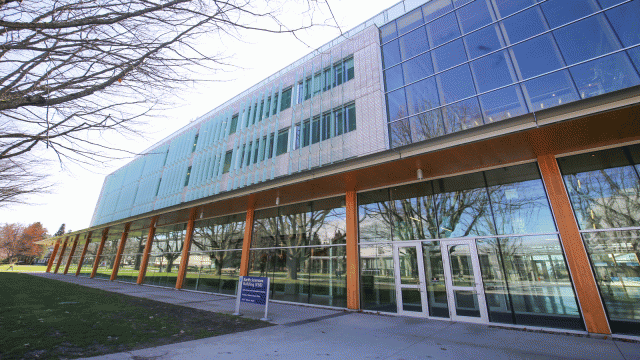This program emphasizes the role of statistics within the general framework of problem solving, and helps you develop an understanding of the concepts of observation, hypothesis, evidence, and validation. You'll learn more about critical statistical reasoning, with emphasis on the development of computational, mathematical, and communication skills, both oral and written.
This program is also offered at UBC's Okanagan Campus
Find out moreWhy this program?
- Tailor the specialization to your interests with electives in computer science, economics, life sciences, commerce, or the social sciences.
- Study at one of Canada’s top-ranked universities in the mathematical sciences.
- Develop critical statistical reasoning, computational, mathematical, and communication skills.
Program information
Send details- Campus: Vancouver
- Faculty: Faculty of Science
- Degree: Bachelor of Science
- Length 4 yrs
- Co-op Yes
- Honours Yes
Statistics is a science that deals with collecting, organizing, and analyzing data, and the theory for statistical methods involves mathematics and probability. Statisticians extract information from data. Due to the ubiquity of computers and ability to collect massive amounts of data, statistics is a significant and ever-growing field of study.
Statistics students select a nine-credit “thematic concentration” in areas such as computer science, economics, life sciences, commerce, or the social sciences to ensure that they can apply statistical methods in another discipline. The concentrations allow you to customize the major or honours programs to reflect your interests, but to a lesser extent than combined major or honours programs.
The BSc Statistics is available as a major, honours, or through the combined honours program. The honours programs are suggested for students interested in pursuing graduate work in the mathematical sciences or another field.
Campus features
The Statistical Consulting and Research Laboratory provide statistical advice to the University’s faculty and graduate students and serves as a statistical research support unit for students in the Department. The statistical sciences interact with virtually every discipline in science, social science, and engineering. Research at UBC’s Department of Statistics reflects the breadth of the field. Examples include biostatistics (statistics relevant medical and health sciences) bioinformatics (genetic data and modelling in medical studies), environmental statistics (geographical, climate modelling), and statistical learning (machine learning and artificial intelligence).
Send detailsLife at UBC's Vancouver campus
Built in 2012 to LEED Gold construction standards, the Earth Sciences Building is home to the Department of Statistics. It houses the department’s computer lab facilities, seminar rooms, lecture halls, and the Statistics Learning Centre.
Find out moreYour future
The BSc in Statistics emphasizes the role of statistics within the general framework of problem solving. The program helps you develop critical statistical reasoning, with emphasis on the development of computational, mathematical, and communication skills. These are highly sought after skills and are transferable to many workplaces.
Statisticians work in almost all areas of science, engineering, business, government, and industry.
Program graduates
- PhD Student in Economics, Stanford University
- Institutional portfolio risk analyst, RBC Global Asset Management
- Statistical analyst, BC Cancer Agency
- Research assistant, Centre for Health Evaluation & Outcome Sciences
- Data scientist, Environment Canada
Program requirements
English-language requirements
English is the language of instruction at UBC. All prospective students must demonstrate English-language competency prior to admission. There are numerous ways to meet the English Language Admission Standard.
General admission requirements
IB Diploma Programme
- Completed IB Diploma, including at least three Higher Level courses.
IB Certificate Courses
- IB Certificate courses (Standard and Higher Level) may be used in an admissions average if you are graduating from a recognized high school curriculum that can be used as your basis of admission.
- IB Math Applications and Interpretations SL, or IB Math Studies, do not satisfy the math requirement for admission to UBC’s science-based programs, the Faculty of Management, the UBC Sauder School of Business, or the Vancouver School of Economics.
Degree-specific requirements: Science
- IB Math Analysis and Approaches SL or HL, or IB Math Applications and Interpretations HL (IB Math Applications and Interpretations SL, or IB Math Studies, are not acceptable)
- One of IB Biology, IB Chemistry, or IB Physics
- Grade 11 or equivalent Chemistry, and
- Grade 11 or equivalent Physics (may be waived with grades of 5 in IB Chemistry and in your IB Mathematics course)
Note: Grade 11 Chemistry and Physics requirements listed are only relevant to students who are not completing the equivalent IB Diploma Chemistry and/or Physics courses.
For students studying outside of Canada, some examples of courses that may be accepted as Grade 11 equivalents are junior-level courses for American students, and IGCSE and O Level for those following British-patterned curricula.
Related courses
The following subject categories are particularly relevant for this degree. Consider taking courses in these areas in your junior year and senior year.
- Language Arts
- Mathematics and Computation
- Sciences
